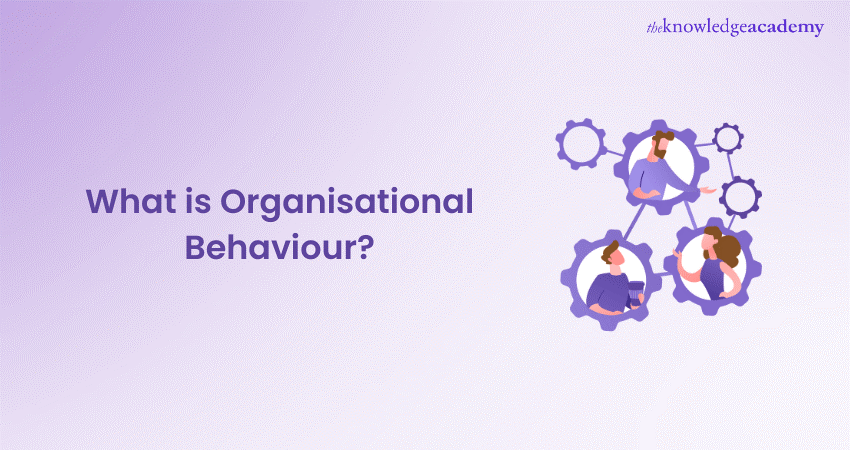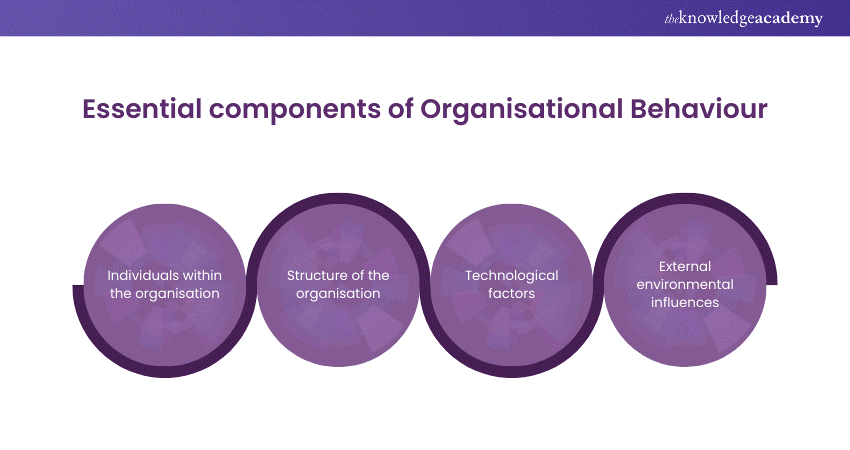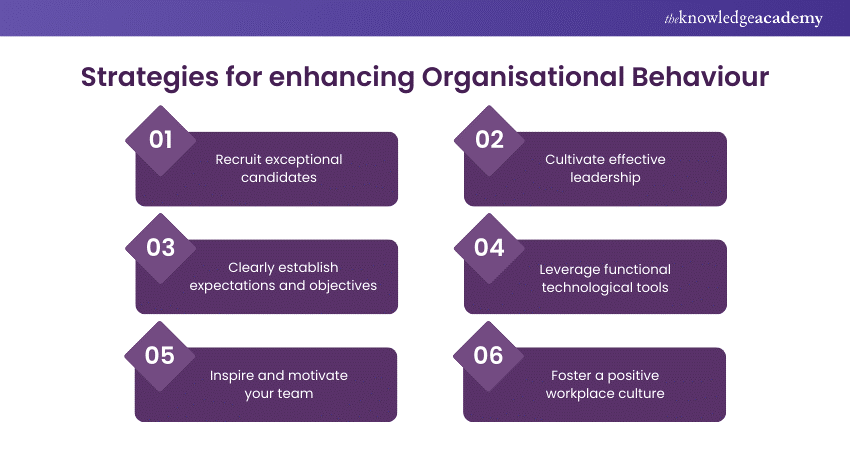We may not have the course you’re looking for. If you enquire or give us a call on +32 35001305 and speak to our training experts, we may still be able to help with your training requirements.
Training Outcomes Within Your Budget!
We ensure quality, budget-alignment, and timely delivery by our expert instructors.

Organisational Behaviour is a multi-faceted field that examines how individuals, groups, and structures impact behaviour within an organisation. It delves into various aspects such as communication, motivation, leadership, and decision-making, offering insights into organisational effectiveness and efficiency.
In this comprehensive blog, we'll explore “What is Organisational Behaviour?” and its fundamental concepts and importance. Additionally, we will explore its key components and strategies for enhancing Organisational Behaviour.
Table of Contents
1) What is Organisational Behaviour?
2) Importance of Organisational Behaviour
3) Understanding the essence of Organisational Behaviour
4) Essential components of Organisational Behaviour
5) Exploring the concept of Organisational Behaviour
6) The role of Organisational Behaviour
7) Strategies for enhancing Organisational Behaviour
8) Conclusion
What is Organisational Behaviour?
Organisational Behaviour delves into the systematic examination of interactions and influences within a company. It encompasses various aspects such as communication patterns, leadership dynamics, decision-making processes, and organisational culture.
Understanding Organisational Behaviour helps in deciphering the complexities of human behaviour in the workplace, enabling organisations to optimise their functioning, enhance employee satisfaction, and achieve their goals effectively. By examining the dynamics of OB, organisations have the capacity to cultivate a favourable workplace atmosphere, enhance productivity, and adjust to the dynamic requirements of the business environment.
Importance of Organisational Behaviour
In this section, we will explore the Importance of Organisational Behaviour. Organisational Behaviour is vital to organisations, as its aides in understanding employee behaviour, communication and providing good leadership. It leads, for one, to improved productivity rates, satisfied staff and organisation's achievements.
Through bringing OB to light, organisations can build positive work culture, deal with any conflicts, and adapt to any environmental changes in business. Finally, the Organisational Behaviour investment establishes the righteous choice and leads to prosperity and progress.
Elevate your skills with the BCS Certificate in Business Analysis Practice Course: Mastering business insight for success!
Understanding the essence of Organisational Behaviour
Organisational Behaviour studies the complex interplays of human instincts within the workplace, including the relationships between employees, departments and the organisational structure. It highlights the importance of individual uniqueness which covers the entirety of people, not only in terms of their work.
The next element concerns the impact of factors outside the organisation, technological developments and the organisational structure on behaviour and management. A comprehensive approach encompasses the aspects that uphold the dignity of everyone, promotes collaboration and align relationships. In addition, it creates an environment that supports the accomplishment of these objectives to attain sustainable success and improved working environment.
Essential components of Organisational Behaviour
The essential components of Organisational Behaviour encompass the intricate interplay between individuals, organisational structure, technological influences, and external environmental factors. Understanding these components is vital for fostering a productive and harmonious workplace culture.

Individuals within the organisation
People are the main factor in organisational prosperity representing their specific talents and points of view. Knowing the behaviour and motivation causes helps in creating a cooperative and performance-oriented atmosphere.
Recognising diversity and creating a chance for every single member to grow empowers collaboration and makes it possible for an organisation to achieve success to the most.
Structure of the organisation
The organisational structure describes who will perform which tasks, how they will interact with each other and in what direction the information needs to flow. It has a bearing on overall efficiency and cooperation within the organisation.
Perceiving and maximising such structure allow companies to set up strategic plans, enhance performance and adapt quickly to the ever-changing environment.
Technological factors
Digital breakthroughs drive organisational performance through communication, collaboration and process improvements. Technology has become an unstoppable force in increasing the productivity and efficiency of people, from digital tools to automation systems.
Leveraging and understanding these factors are critical for the survival of this market and keeping pace with the changing consumer patterns is crucial.
Launch your career with confidence: BCS Foundation Certificate in Business Analysis Course - Your path to professional excellence!
External environmental influences
External factors such as economic circumstances, market rivals, and societal patterns apparently have a meaningful influence on Organisational Behaviour and decision-making. Resisting these forces may prove fatal to the survival and success of the organisation.
The mastery of navigating the external environment works to the advantage of organisations, their agility, and their swift response to ever-incoming changes.
Exploring the concept of Organisational Behaviour
Organisational Behaviour is a multi-faceted topic that involves various factors. Let us explore some of them here:
Embracing individual uniqueness
Understanding and appreciating the differences in the diversity of each person’s culture, experience, and opinion creates an atmosphere of inclusion and inventiveness within the company. Through the positive valuation of each person's talents and qualifications, organisations build cultures of respect and creativity, which ultimately brings increased productivity, satisfaction and engagement of the employees.
Recognising the wholeness of individuals
Recognising the fact that individual's lives are complex with life outside work promotes empathy and understanding at the organisation level. The fact that personal well-being is considered along with professional responsibilities creates an environment where people are valued and they are well-motivated to work, more productive, and they enjoy their work.
Understanding behaviour causality
Studying the determinants of actions within a company, which consist of individual capabilities, work environment and organisational circumstances, helps us to unveil the causes of behaviour. Comprehending those intricacies, organisations can bring their operations closer to the facts, which enhances the efficiency and results in better decision-making.
Upholding dignity of every individual
Establishing a culture of respect and fairness notes that the dignity of each person would be a priority in the organisation. Through the recognition of the worth of every individual and the application of morals and fairness, respect and commitment are cultivated which ultimately form a more harmonious and inclusive workplace creating an environment that is more favourable to productive collaboration.
Viewing the organisation as a social entity
Acknowledging the internal system of the organisation as a complex social system is the same as recognising the degrees of interconnectedness among different individuals and groups within the organisation. Through understanding and use of social horisons associations can create opportunities for cooperation, communication, building cohesion that in return gives positive effect to the performance and achieving the intended goals.
Acknowledging shared interests among organisational members
Establishment of the unified objectives and goals is facilitating team building and the joint efforts. By integrating individual objectives with company aims, companies can induce the whole collective energy and commitment, which, in turn, will drive performance and facilitate the achievement of common aims swiftly and accurately.
Embracing a holistic approach
Adopting a holistic perspective considers the interconnectedness of individual, group, and organisational factors. By addressing the diverse needs and complexities within the organisation, a holistic approach promotes comprehensive solutions that enhance performance, foster collaboration, and create a supportive and inclusive work environment conducive to sustained success.
Revolutionise your approach with BCS Practitioner Certificate in Modelling Business Processes Training: Streamline Success with Expertise!
The role of Organisational Behaviour
Organisational Behaviour plays a pivotal role in shaping the culture, efficiency, and effectiveness of an organisation. By understanding the dynamics of individual and group behaviour, organisations can optimise their structures, processes, and systems to maximise productivity and employee satisfaction.
Additionally, Organisational Behaviour informs leadership strategies, communication practices, and decision-making processes, enabling leaders to inspire and motivate their teams towards shared goals.
Moreover, by promoting a positive work environment that values diversity, respect, and collaboration, Organisational Behaviour contributes to employee retention, talent development, and overall organisational success in an ever-evolving business landscape.
Strategies for enhancing Organisational Behaviour
In this section, we will explore efficient strategies for enhancing Organisational Behaviour. Let’s take a look at them below:

1) Recruit exceptional candidates
Attracting outstanding candidates entails recognising individuals who not only possess requisite skills and qualifications but also resonate with the values and culture of the organisation. By selecting candidates who demonstrate passion, adaptability, and a strong work ethic, organisations can build high-performing teams that drive success and innovation.
2) Cultivate effective leadership
Cultivating effective leadership involves developing leaders who can inspire, motivate, and guide teams towards achieving common goals. By fostering qualities such as empathy, communication skills, and strategic vision, organisations empower leaders to drive positive change, foster innovation, and cultivate a culture of excellence and collaboration.
3) Clearly establish expectations and objectives
Clearly defining expectations and objectives provides direction and clarity for employees, ensuring alignment with organisational goals. By communicating expectations effectively and setting measurable objectives, organisations empower employees to understand their roles, prioritise tasks, and contribute to the achievement of collective success.
4) Leverage functional technological tools
Utilising functional technological tools enhances communication, collaboration, and efficiency within the organisation. Through investments in tools like project management software, communication platforms, and data analytics, organisations streamline processes, optimise workflows, and maintain competitiveness in a swiftly evolving digital environment.
5) Inspire and motivate your team
Inspiring and motivating your team involves recognising and rewarding their contributions, providing opportunities for growth and development, and creating a supportive and engaging work environment. By fostering a culture of appreciation, empowerment, and continuous learning, organisations cultivate high-performing teams that drive innovation and success.
6) Foster a positive workplace culture
Fostering a positive workplace culture entails promoting values such as trust, respect, and collaboration. By nurturing a supportive environment where diversity is celebrated, feedback is valued, and work-life balance is prioritised, organisations create a culture that inspires creativity, enhances employee well-being, and drives sustainable growth.
Conclusion
Organisational Behaviour is the cornerstone of a thriving workplace. By understanding What is Organisational Behaviour, organisations can unlock the full potential of their workforce, drive innovation, and achieve sustainable success in today's dynamic business environment.
Embrace change with confidence: BCS Foundation Certificate in Business Change Course - Your catalyst for transformation!
Frequently Asked Questions

The focus of Organisational Behaviour is understanding how individuals, groups, and structures within an organisation impact behaviour to improve organisational effectiveness.

The focus of Organisational Behaviour is understanding how individuals, groups, and structures within an organisation impact behaviour to improve organisational effectiveness.

The Knowledge Academy offers various Business Analysis Courses, including BCS Certificate in Business Analysis Practice Course, BCS Practitioner Certificate in Requirements Engineering Course and BCS Foundation Certificate in Organisational Behaviour Course. These courses cater to different skill levels, providing comprehensive insights into Business Environment Analysis.
Our Business Analysis Blogs cover a range of topics offering valuable resources, best practices, and industry insights. Whether you are a beginner or looking to advance your skills, The Knowledge Academy's diverse courses and informative blogs have you covered.

The Knowledge Academy’s Knowledge Pass, a prepaid voucher, adds another layer of flexibility, allowing course bookings over a 12-month period. Join us on a journey where education knows no bounds.

The Knowledge Academy offers various Business Analysis Courses, including BCS Certificate in Business Analysis Practice Course, BCS Practitioner Certificate in Requirements Engineering Course and BCS Foundation Certificate in Organisational Behaviour Course. These courses cater to different skill levels, providing comprehensive insights into Business Environment Analysis.
Our Business Analysis Blogs cover a range of topics offering valuable resources, best practices, and industry insights. Whether you are a beginner or looking to advance your skills, The Knowledge Academy's diverse courses and informative blogs have you covered.
Upcoming Business Analysis Resources Batches & Dates
Date
 BCS Certificate in Business Analysis Practice
BCS Certificate in Business Analysis Practice
Sat 4th May 2024
Mon 13th May 2024
Tue 28th May 2024
Mon 10th Jun 2024
Mon 24th Jun 2024
Mon 8th Jul 2024
Sat 20th Jul 2024
Mon 22nd Jul 2024
Mon 5th Aug 2024
Mon 16th Sep 2024
Mon 30th Sep 2024
Mon 28th Oct 2024
Sat 2nd Nov 2024
Mon 25th Nov 2024
Mon 9th Dec 2024







 Top Rated Course
Top Rated Course



 If you wish to make any changes to your course, please
If you wish to make any changes to your course, please


